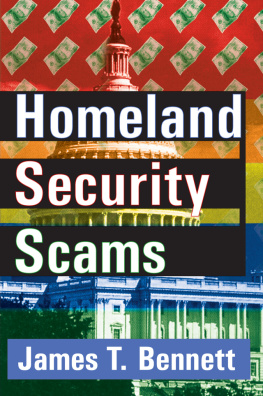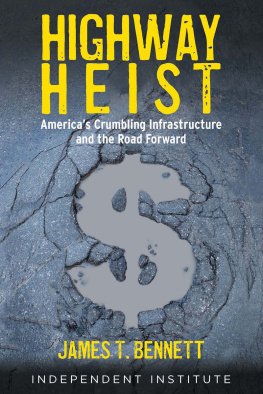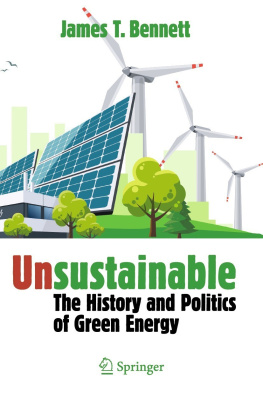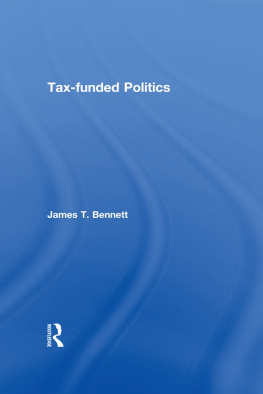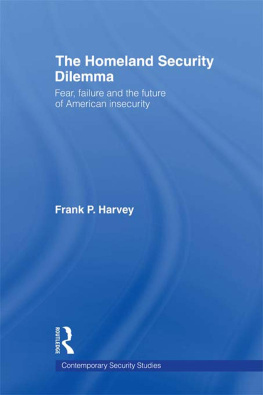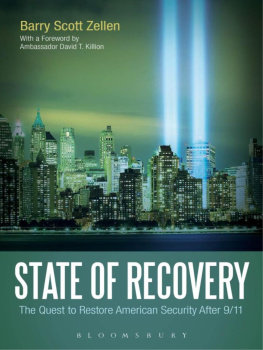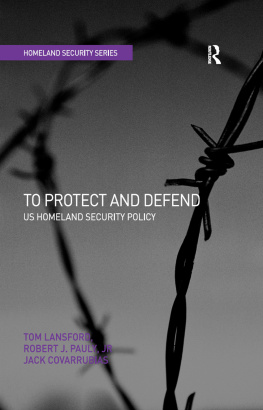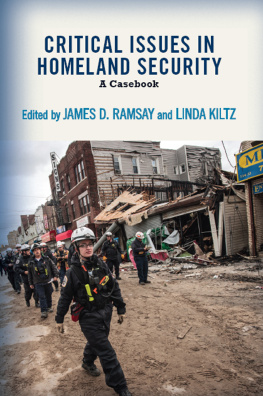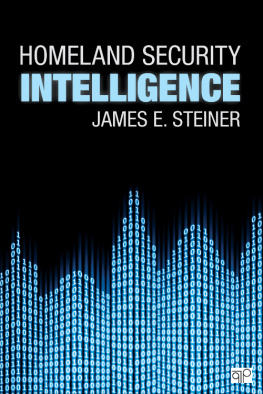First published 2006 by Transaction Publishers
Published 2017 by Routledge
2 Park Square, Milton Park, Abingdon, Oxon OX14 4RN
711 Third Avenue, New York, NY 10017, USA
Routledge is an imprint of the Taylor & Francis Group, an informa business
Copyright 2006 by Taylor & Francis.
All rights reserved. No part of this book may be reprinted or reproduced or utilised in any form or by any electronic, mechanical, or other means, now known or hereafter invented, including photocopying and recording, or in any information storage or retrieval system, without permission in writing from the publishers.
Notice:
Product or corporate names may be trademarks or registered trademarks, and are used only for identification and explanation without intent to infringe.
Library of Congress Catalog Number: 2006044694
Library of Congress Cataloging-in-Publication Data
Bennett, James T.
Homeland security scams / James T. Bennett.
p. cm.
Includes bibliographical references and index.
ISBN 0-7658-0334-8 (alk. paper)
1. United States. Dept. of Homeland Security. 2. Internal security
United States. 3. Civil rightsUnited States. 4. War on Terrorism, 2001
I. Title.
HV6432.4.B45 2006
363.340973dc22 2006044694
ISBN 13: 978-0-7658-0334-4 (hbk)
Introduction: Pork Has a New Name
"[P|rior to September 11th, if somebody had mentioned the term homeland security at one of our town-hall meetings, most people would have thought they were talking about a savings-and-loan association," remarked Rep. Bob Barr (R-GA) at a hastily scheduled June 20, 2002 congressional hearing on the proposed Department of Homeland Security.
Barr was very soon to be an ex-congressman. His skepticism over aspects of the Bush administration's war on terrorism earned him a party-line Republican primary opponent who sent one of the handful of independent-minded congressmen back homeor, more accurately, into consulting, which is what passes for "home" to most of our federal lawmakers.
Barr's point, though, is one that has been ignored in the "homeland security" frenzy of post-9/11 America. Just what is "homeland security"? What, an American may be excused for asking, is the "homeland"? The term, with its echo of "fatherland," has the unsavory odor of German fascism and Stalinist Russia. As the Capital Times of Madison, Wisconsin, cogently noted, "Americans have never used the word 'homeland' to describe their country" and the many thousands of towns, villages, streets, states, and postage stamps of grounds therein. Homeland securitythe very wordis, literally, un-American.
The leftist writer Douglas Valentine has charged that "Homeland security is a euphemism for internal security," and given the alternately spendthrift and repressive provisions of the Homeland Security Act, he is not wrong. But that is not the half of it.
For homeland security is developing into the largest boondoggle in the history of the U.S. government. Fed by the associated "war on terror," homeland security is being used as an excuse, as an irrefutable justification, for a vast expansion of government power and spending. This spending is often on matters far removed from anything that might be termed "defense" under even the most charitable definition.
Even those federal dollars going toward apparently legitimate antiterror initiatives are disbursed in the most downright pork-barrel fashion. They flow into counties, programs, and departments that face no imaginable threat from bin Laden, bioterrorists, or the rest of the new rogue's gallery that is being used to justify this vast expansion of state power. "Homeland security" is not making us safer: just poorer, less free, and more dependent on the federal government.
While some have warned, not without cause, that "homeland security" is the American phrase for what the nations of the communist bloc used to call "internal security," it may be closer to the mark to say that homeland security is the most effective combination of words ever devised to disguise the pork barrel, Even more effectively than that hoary piece of cant "for the children," which is how vast stretches of the welfare and social services bureaucracies explain their mission, "homeland security" isfor nowa fail-safe way of forcing taxpayers to pony up for your favorite government program. Just try speaking in opposition to appropriations for homeland security: You'll be pegged as a bin Laden disciple, an al Qaeda plant, a fanatical and deeply unpatriotic hater of fire fighters. Across the heartland, fire chiefs and police chiefs and emergency medical crewspeople who do good, vital workhave found themselves deluged by homeland security manna from Washington. Some have refused the bounty, protesting that it is quite unnecessary; others spend it every way they can, on armed vehicles to protect shopping malls, gas masks for police officers whose towns are smaller than Mayberry RFD, and biohazard suits for Podunk emergency personnel who will never have to pick up anything more toxic than a week-old burrito. The money is pouring into the provinces so fast that overwhelmed local officials can't spend it swiftly enough: North Carolina spent only 30 percent ($64.7 million of $217.4 million) of the federal homeland security monies it had received through 2004.
The Bush administration has defined this protean term this way: "Homeland security encompasses those activities that are focused on combating terrorism and occur within the United States and its territories. Such activities include efforts to detect, deter, protect against and, if needed, respond to terrorist attacks."
To this end, President Bush and the vast majority of Congress supported the creation of the Department of Homeland Security, the
The seemingly ageless West Virginia Democratic Senator Robert Byrd asked, "How is it that the Bush administration's No. 1 priority has evolved into a plan to create a giant, huge bureaucracy? How is it that Congress bought into the belief that to take a plethora of federal agencies and shuffle them around would make us safer from future terrorist attacks?"
Good questions. But when Pork Barrel Bobby Byrd becomes the voice of fiscal sanity, we're in big trouble.
In his groundbreaking book. Terrorism and Tyranny, the investigative journalist James Bovard has written that "the war on terrorism is the first political growth industry of the new millennium." It shows no signs of abatingwhichever party is in power.
Under President George W. Bush, the Republicans have become the party of Big Government. Or at least they are trying to, though they find their path to that dubious mantle blocked at every step by the Democrats, whose chief complaint against the homeland security apparatus is that it is inadequately funded.

